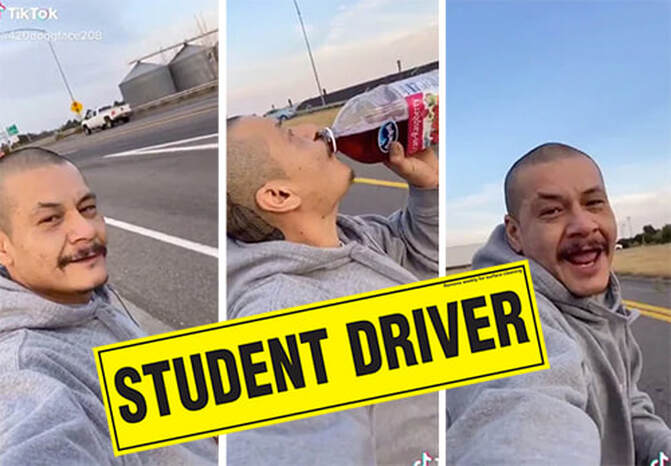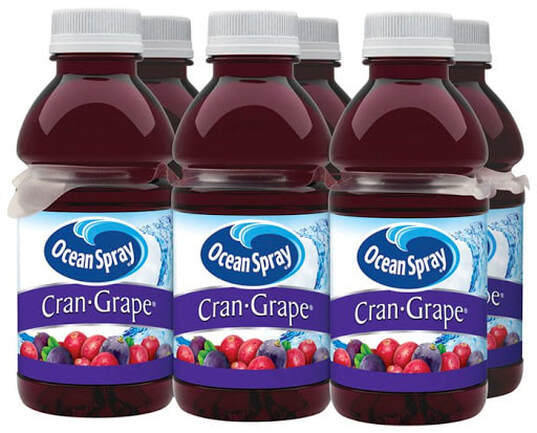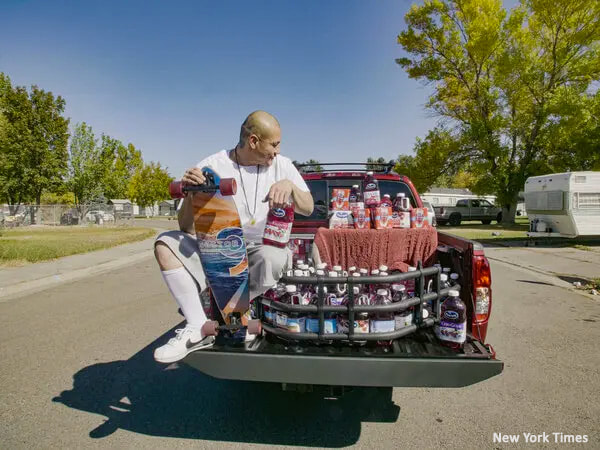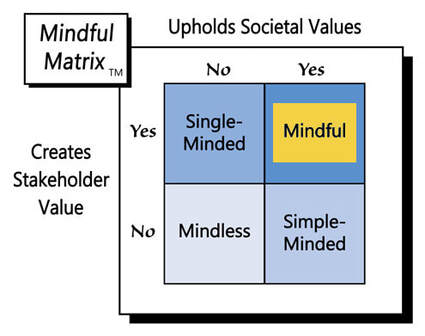author of Honorable Influence - founder of Mindful Marketing
In a social-media-driven world, marketers increasingly face a dilemma: Should they keep communication control or slide into the passenger seat and allow someone with no professional experience and little company commitment drive their promotional strategy? That’s the question Ocean Spray has had to answer as a longboard-riding, selfie-stick-toting Idaho potato worker unexpectedly drove the firm into pop culture prominence.
Nathan Apodaca wasn’t well-known before he posted the 25-second TikTok clip of himself skateboarding to work, while lip-syncing to the Fleetwood Mac classic “Dreams,” and sipping from a 64 oz. bottle of Ocean Spray cranberry juice. However, the video went viral, gaining over 46 million views and almost 8 million likes, while also grabbing mainstream media attention from the likes of CNN to NPR.
Meanwhile, the cranberry cooperative from Middleboro, MA must have been asking itself, “What just happened?” and “How do we handle it?”
When you think of food companies with conservative product lines, there aren’t many more staid than Ocean Spray. It’s not Nantucket Nectars or Snapple with their overabundance of very creative drink concoctions. The majority of Ocean Spray’s juices, as well as many of its other products contain cranberries, which seem positioned somewhere between raisins and prunes and probably appeal more to ‘mature’ than to youthful palettes.
Case in point, I’m a member of Gen X whose beverage repertoire happens to be boring—I drink little besides water, but I do have a glass of Ocean Spray Cran-Grape juice every day. All that to say, I suspect much of the company’s revenue comes from other mundane middle-agers-or-olders like me. I doubt those in Ocean Spray’s target market are heavy users of TikTok, which makes the firm’s reaction to its sudden social media fame even more remarkable.
However, Ocean Spray didn’t jump on Apodaca’s longboard immediately; instead, it ‘took a beat’ for over a week, which in social media time can seem like an eternity. Still, positive public reaction suggests that the company’s move was ‘lit’—not sure if I’m using that term correctly.
The firm first did its homework and found that Apodaca wasn’t simply someone aiming for internet fame or a corporate payday. He was a hard-working father, living in a mobile home, whose pickup truck died on the way to his job at the potato factory. Rather than miss work, Apodaca pulled the skateboard from his truck, jumped on and, with hydration in hand, began cruising toward the plant. Videoing himself was a spontaneous thought, brought on by the “Dreams” tune and a desire to capture the uniquely ‘chill’ moment.
Ocean Spray, in turn, captured the hearts of the nation and beyond by gifting the stunned Apodaca a new cranberry red Nissan pickup truck, packed with a generous cache of the company’s products.
Meanwhile, TikTok parodies have proliferated. Those grabbing a bottle of Ocean Spray and skateboarding to the sound of “Dreams” have included legendary Fleetwood Mac drummer Mick Fleetwood, Ocean Spray CEO Tom Hayes, and lieutenant governor of Montana and governor candidate Mike Cooney.
From surprising Apodaca with a new truck to filming their CEO’s own TikTok tribute, it seems like Ocean Spray did everything right, but one could also argue that the company was living dangerously by jumping on the TikTok longboard, for three reasons:
1. Skateboarding Spills: From the first time I saw Apodaca’s TikTok, I wondered about the safety. Since my own skateboarding experience was very limited and decades ago, I ‘let it ride,’ until I had an opportunity to ask those in a college class their opinions.
One student, Jordan, said he uses an E-skate (electric skateboard) to commute to campus. While he acknowledged the freedom that some enjoy from riding unencumbered, he was quick to call Apodaca’s approach “ill-advised” because of: multiple distractions (juice, music, camera), no protective equipment, and proximity to fast-moving traffic. He also showed a nasty scrape he sustained from a recent spill, even while wearing a helmet and reinforced leather gloves.
But, why should Ocean Spray worry about any such accidents? It would be tragic to read the headline: “Car Kills Teen Doing Ocean Spray TikTok Parody.” Yes, people will mimic Apodaca regardless what Ocean Spray does, but the company’s support of the viral celeb and its own CEO's imitation could be construed as support for the act and its disregard for danger.
2. Unknown Endorser: Most of the time, famous spokespeople work out well for their sponsors, largely because celebrities are ‘known commodities’ who have been living in the public spotlight for years. Even then, though, there are times when a celebrity’s poor choices sour the promotional partnership, e.g., Olympic swimmer Ryan Lochte in Brazil.
When an ordinary person suddenly rises from obscurity to become the face of a brand, there is increased risk related to an unknown history and uncertainty how he/she might act going forward, both of which could lead to another very undesirable headline, e.g., “BREAKING NEWS: Ocean Spray Spokesman Apodaca . . .”
3. Brand Confusion: In keeping with the prior point, brands carefully choose their spokespeople and dozens of other identity-defining elements in order to position themselves precisely where they’d like to be in consumers’ minds relative to the competition. Allowing whoever happens to shoot a viral video of themself become the face of one’s brand seems like a pretty nonstrategic approach.
If Ocean Spray wants to move its image in the direction of ‘younger,’ ‘carefree,’ and possibly even ‘irreverent,’ the TikTok tie-in works. If not, embracing the viral video could create some cognitive dissonance when consumers attempt to interpret it in light of the company’s other marketing communication.
However, the three cautions above must be interpreted against the reality that Ocean Spray really had to do something. Not acknowledging the viral video would have made the company seem ungrateful, not to mention completely out of touch.
Even though Ocean Spray didn’t ask for Apodaca’s promotional help, the right thing to do was to reward him for the enormous exposure he created for the brand. When someone shows you kindness, you thank them; and, if you’re a company with the resources of Ocean Spray, you do more.
In deciding how much gratitude ($$$) to show, company management may have wondered whether the Tik Tok-driven sales uptick would last. As parodies focus on other things, the firm’s revenue will relapse, but probably not entirely. Some of its newly-won market share may last, as operant conditioning suggests: At least some people who never had Ocean Spray before shooting their own video probably tried it, liked it, and will buy it again.
Similarly, the entire Tik Tok episode may have the effect of lowering the bottom end of Ocean Spray’s age demographic, which is something almost any brand would like. At some point, every organization must appeal to the next generation; otherwise, it goes to the grave with an ever-aging target market.
Still, were these rewards worth the three risks outlined above? My cautious answer is—Yes.
First, the idea of Ocean Spray implicitly endorsing Apodaca’s somewhat dangerous ride is mitigated by the fact that his truck broke down and he was just trying to get to work. It wasn’t a thrill ride for the sake of social media shares. Plus, company CEO Hayes and others have modeled safer and still-satisfying Tik Tok tributes.
Second, should anything unseemly surface from Apodoca’s past or taint his future brand ambassadorship, Ocean Spray could easily pull the plug on the affiliation. Likewise, knowing Apodaca’s situation and the impromptu circumstances under which the relation was formed, the public probably would give some grace to both the individual and the organization.
Third, most of the people who could potentially experience brand confusion from Ocean Spray’s positioning pivot probably aren’t on Tik Tok anyway. That media/demographic separation combined with what will likely be a relatively short shelf-life for the video, should mean that traditional perceptions of the brand remain largely intact.
I still enjoy the control of being behind the wheel. I don’t mind, though, when someone else drives, as long as I feel safe and I have some input into where we’re going. Marketers increasingly need to know when to slip into the passenger seat, yet continue to influence the way to the destination, all while someone with less promotional experience drives.
Like Ocean Spray, those who can successfully navigate that unique balance are on the road to “Mindful Marketing.”
Learn more about the Mindful Matrix.
Check out Mindful Marketing Ads and Vote your Mind!





 RSS Feed
RSS Feed